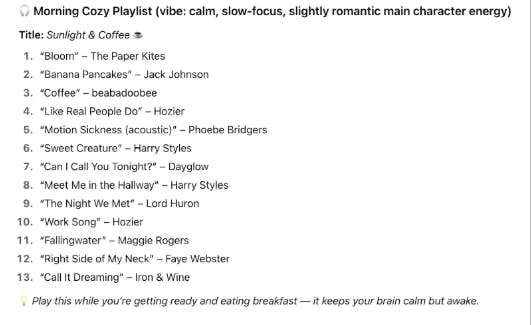Generative artificial intelligence has become a major actor in decision-making, even for mundane tasks. It’s widely used, from academics to entertainment, helping create study guides, grocery lists or silly images from a prompt in just one click. But is it a useful tool in making day-to-day decisions, and what happens when it does?
To test this, I took a “decision holiday” on Oct. 21. I told ChatGPT I was a student and that my fixed activities for the day were a 9 a.m. meeting and an 11 a.m. class. Throughout the day, I asked ChatGPT to make every decision that came across my mind.
AI instructed me to wake up at 7:15 a.m.

Because I didn’t have a “cozy” playlist that was lo-fi or acoustic, I asked Chat to generate one for me.

After a breakfast of “Greek yogurt + granola + honey + fruit” because Chat said I “can’t skip breakfast” and “I need the energy,” I took notes before my advisor meeting. Before the meeting, it told me to take ten breaths to set the tone.
After my meeting, Chat told me to reward myself with a small break that consisted of either a walk or a light snack. It specifically told me not to scroll and that I’ll “thank myself later.” Without asking, Chat described the snack option as a banana with peanut butter. I had no banana and no peanut butter, so a walk along the Lakeshore path was my break.
At this point, I’ve become more aware of how often I actually decide something everyday. Prior to the experiment, I figured my days had been pretty similar enough that using AI for decision-making wouldn’t change much. However, I found myself often asking Chat to choose between trivial things I would have otherwise easily done myself.

In a way, it was nice just to have someone make my decisions for me. I wouldn’t waste time debating what to eat or how to spend awkward gaps of time. It was convenient.
This was a demonstration of experiencing cognitive offloading, which describes the concept of using external tools to help with tasks that may create mental strain, including memory, planning and decision-making.
It’s easy to get wrapped up in using AI because of its efficiency. While it frees up cognitive resources, it might imply a reduction for the need for deep cognitive involvement and critical thinking. However, scholars argue because AI is taking away the responsibility of simple cognitive tasks, it leaves more room for complex thinking.
When utilizing AI in this capacity, it’s useful to store ‘memories’ for future reference. You can tell AI what you do and do not like, if you have any food allergies or what streaming service subscriptions you have. After telling Chat I had access to Netflix, it changed its recommendation of an “evening show choice” from “New Girl” to “Gilmore Girls.”
Another benefit of AI’s efficiency is how it evaluates two choices. In the case of choosing my mode of transportation back, bus or walk, I conversed with ChatGPT about travel times, weather, what specific shoes I was wearing and if I had access to an umbrella.
While providing AI with certain aspects of my life as the day went on, I did not share my usual routine. Because of this, a lot of my day was making sure what needed to be done was done, especially schoolwork. It also made me go to bed earlier than I usually do, but that was probably better for me anyway.

Before I clicked out of the tab, I asked ChatGPT one final question: Does AI help us make better decisions?
Its answer: AI helps us make better decisions when it’s a partner, not the decider.
Impressions
It’s easy to become dependent on AI, especially in cases where big or small decisions can be made in an instant.
There isn’t much of a concrete answer that proves whether AI should be used in decision-making. Various factors need to be considered, whether the decision is subjective or objective, the ethics of it and whether human oversight is always needed.
From my experience, I don’t believe AI should be used for decision-making. It was an extremely accessible tool to save time and let myself be told what to do, but that was also the drawback.
I didn’t like feeling reliant on an AI chatbot for the entirety of my day. It felt like my individuality was being stripped away at the expense of convenience.
What’s hard is that AI is becoming more and more integrated into daily life, making it harder to avoid its dependence. The more we rely on AI, the more we risk losing touch with the human skills and judgement it was designed to support.






